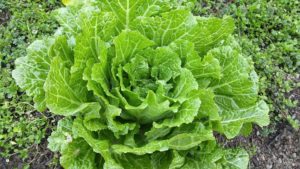 It seems almost every cosmetic, face cream, face or eye serum, and body lotion contains hyaluronic acid — as a major ingredient. But, what is it and why is it so important?
It seems almost every cosmetic, face cream, face or eye serum, and body lotion contains hyaluronic acid — as a major ingredient. But, what is it and why is it so important?
Hyaluronic acid is a naturally occurring substance found throughout the human body. It is also found in the bodies of all animals, including microbes. The cells in the body manufacture hyaluronic acid. In fact, it is a matrix which surrounds our cells.
The Matrix (not that one)
A matrix is an environment or material in which something develops. For example, the uterus is the matrix for an unborn child. A matrix is also a medium or substance that surrounds or supports something. The hyaluronic acid in our bodies surrounds, supports and nourishes our cells.
 Think of hyaluronic acid like a Jell-O mold with fruit. Bits of fruit rest, suspended in the semi-soft substance of gelatin. The Jell-O supports the fruit, keeping the fruit bits from sticking together. In much the same way, the hyaluronic acid that surrounds our cells prevents them from sticking together.
Think of hyaluronic acid like a Jell-O mold with fruit. Bits of fruit rest, suspended in the semi-soft substance of gelatin. The Jell-O supports the fruit, keeping the fruit bits from sticking together. In much the same way, the hyaluronic acid that surrounds our cells prevents them from sticking together.
Brain Bath
Hyaluronic acid is an important component of synovial fluid. Special cells within the brain produce this fluid, which bathes and nourishes our brain, nerves and joint tissues. Fluids in the eyes and joints feature the highest concentration. Fifty percent of the hyaluronic acid produced by the body is in the skin.
Hyaluronic acid binds with water. In fact, it attracts 1000 times its own weight in water!! It is nature’s moisturizer, which is essential to the function of our bodies. Bodily fluids, tissues and cells also contain it. And it serves the vital function of keeping cells hydrated. Hyaluronic acid lubricates muscular connective tissues by enhancing the sliding between adjacent tissue layers.

In the Skin
Hyaluronic acid is vital to the maintenance of healthy connective tissue. It is also involved in cell migration, wound healing, formation of blood vessels, and skin elasticity. Aging skin is associated with loss of moisture. And hyaluronic acid is the key molecule involved in skin moisture.
As we age, the body produces less hyaluronic acid, leading to wrinkles and causing joints to ache.
The big question is: What can we do about it?
Some foods encourage hyaluronic acid production. These include bone broth, soybeans, leafy greens, citrus fruits and starchy root vegetables. These provide bioavailable sources of the hyaluronic acid matrix.
How to Replace Hyaluronic Acid
 Liquid BioCell Life, Skin, Sport, and Pure are the ONLY sources for a liquid matrix of collagen and hyaluronic acid that are virtually identical to the matrix in our bodies. Scientific studies of the product have found that subjects who took Liquid BioCell Life daily for 12 weeks see an increase in hyaluronic acid of 6000%.
Liquid BioCell Life, Skin, Sport, and Pure are the ONLY sources for a liquid matrix of collagen and hyaluronic acid that are virtually identical to the matrix in our bodies. Scientific studies of the product have found that subjects who took Liquid BioCell Life daily for 12 weeks see an increase in hyaluronic acid of 6000%.
Some information for this post comes from the following source: Papakonstantinou, E. et al, Hyaluronic acid: A key molecule in skin aging’ in Dermato Endocrinology 4.3 (2012) pp. 253-258.al